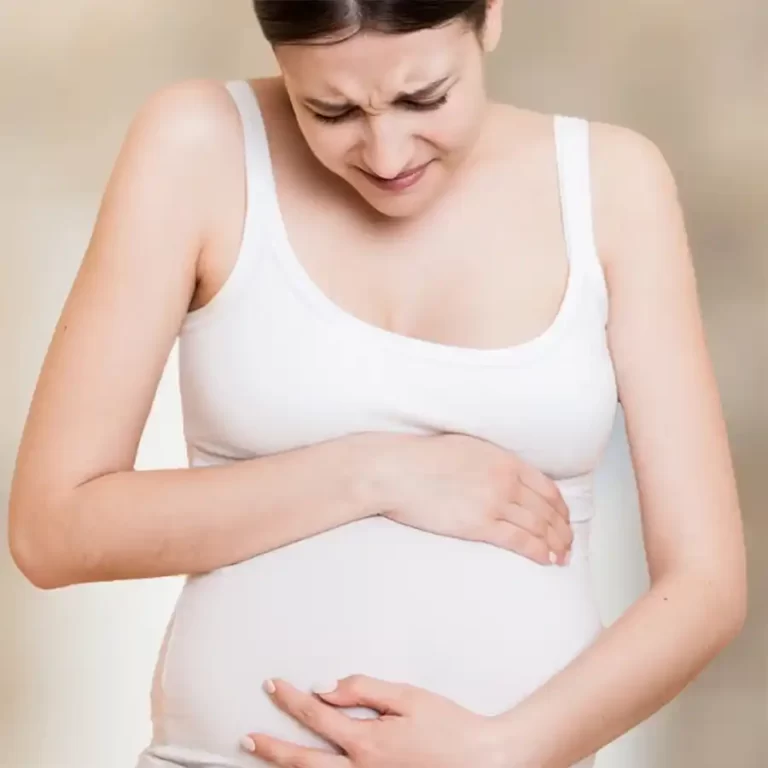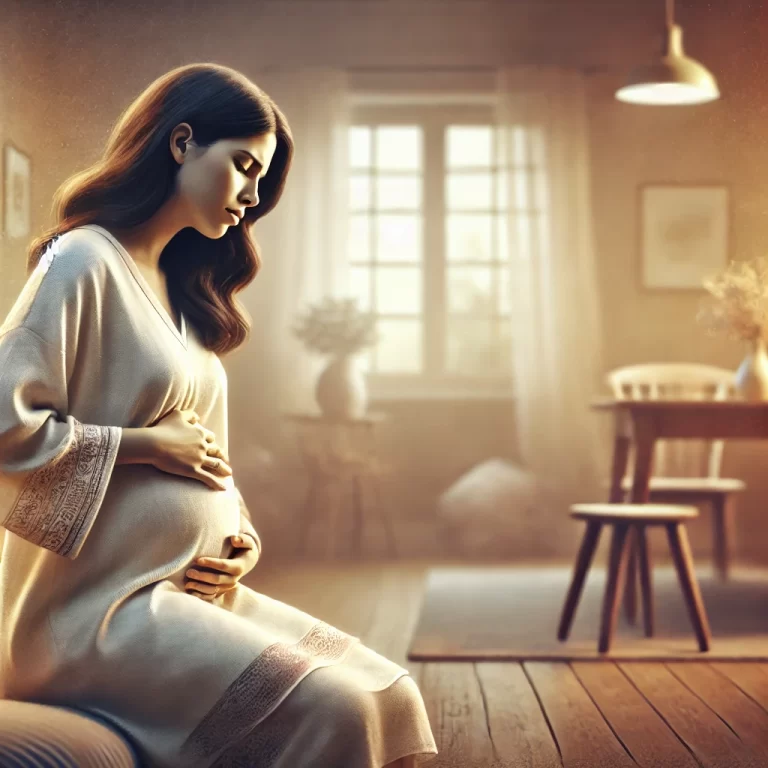Late Pregnancy Abdominal Pain: 3 Key Facts
Late Pregnancy Abdominal Pain: 3 Key Facts
Pregnant women always need special care. Pregnant women always feel worried about any small changes in their bodies. Some pregnant women may feel lower abdominal pain in the last months of pregnancy. However, abdominal pain is not always a sign of labor, it can be caused by many different reasons.
So, is abdominal pain in the last 3 months of pregnancy dangerous? Pregnant women should know all about the signs of labor preparation. With the following sharing, let’s learn more about this issue with Wilimedia!
Is abdominal pain normal during pregnancy?

Abdominal pain is a common symptom when the embryo begins to implant in the uterine lining in early pregnancy. Abdominal pain may recur during the third trimester as the uterus stretches to accommodate the growing fetus. Some women experience heartburn from gastroesophageal reflux or from a feeling of tightness in the abdominal skin.
Abdominal pain in the third trimester of pregnancy is caused by a number of serious conditions, such as:
-
- Severe abdominal pain that is beyond the pregnant woman’s ability to bear.
- Abdominal pain and vaginal bleeding.
- Abdominal cramps that do not stop.
- Abdominal pain accompanied by fever, dizziness, high blood pressure, headache, shortness of breath, visual disturbances, and fatigue.
- Abdominal pain accompanied by jaundice in one area or the whole body, yellowing of the eyes, itching
- Abdominal pain accompanied by dizziness and fainting.
- Abdominal pain, difficulty urinating, or blood in the urine
- Contractions more than 4 times in an hour may be a sign of labor. If this happens before 37 weeks, pregnant women should be careful because it can lead to premature birth.
Therefore, pregnant women should not be subjective when you feel pain in the lower abdomen in the last months of pregnancy. Pregnant women need to be evaluated immediately when there are dangerous symptoms because they can threaten the life of the fetus. To ensure the health of both themselves and the fetus, pregnant women must have regular check-ups and receive advice on diet and lifestyle.
Pregnant women have abdominal pain in the last 3 months of pregnancy, the cause of this condition

Pregnant women worry about the possibility of premature birth because they often have lower abdominal pain in the last month. In particular, this sign may be different from normal pregnancy reactions. In addition, false labor pain, also known as Braxton Hicks contractions, is a symptom that is most easily confused with labor. So how to distinguish it is necessary?
Factors that can lead to abdominal pain in the last three months of pregnancy include:
Signs that you are about to give birth
If pregnant women often have abdominal pain, amniotic fluid leakage, back pain or mucus plug dislodgement, this may be a sign of labor, the baby is about to be born. Therefore, pregnant women should stay calm and contact medical staff for detailed instructions.
False labor (Braxton Hicks contractions) in pregnant women
False labor contractions, also known as physiological contractions, can occur in the second or third trimester. Braxton Hicks contractions usually last 30 seconds to 1 minute and cause the pregnant mother to tense and have lower abdominal pain but do not open the cervix. Braxton Hicks contractions in pregnant women in the third trimester are a normal sign, so mothers do not need to worry or be afraid.
Signs of impending labor
-
- Pregnant women experience continuous and prolonged abdominal pain in the last months of pregnancy.
- Symptoms include amniotic fluid leakage, mucus plug detachment, and back pain.
When determining the condition, the mother should quickly go to the hospital if there are signs of labor.
Constipation
Pregnant women often have loss of appetite, poor appetite, and sometimes uncontrollable cravings. Constipation in pregnant women can be caused by unscientific eating, lack of nutrients, and eating too much food.
Severe pain in the lower abdomen can also be caused by the uterus constantly pressing on the intestinal wall or a rapid increase in Progesterone levels, which reduces intestinal motility. Pregnant women need to establish a diet and exercise regimen that is gentle and appropriate to deal with this condition.
Liver and gallbladder
Abdominal pain is a common symptom during pregnancy. Pain in the upper right abdomen, below or near the ribs, can be caused by the liver or gallbladder. Pregnant women may experience nausea, vomiting, or cramping pain, jaundice, and itching. This condition is called “cholestasis of pregnancy” due to hormonal changes that occur during pregnancy.
Upper abdominal pain, nausea, and changes in stool color are symptoms of pancreatitis. Pancreatitis causes infection and trauma. Pregnant women should consider whether to be hospitalized or not depending on whether the condition is serious and affects their health.
Stretched skin
As the fetus grows, the skin in the abdomen stretches due to the enlarged uterus. Symptoms of stretched skin during pregnancy can include itching and pain on the outside of the skin rather than deep in the abdomen.
Stretched skin can be relieved by gently massaging the abdomen, taking warm baths, and applying lotion.
Reflux from the stomach, bloating
About 17% to 45% of pregnant women experience heartburn, a common symptom. As the fetus grows, abdominal pressure can increase this acid reflux.
If the pain extends to the chest and is burning behind the breastbone, it may be due to acid reflux. To improve symptoms, pregnant women can use some over-the-counter heartburn medications, eat smaller meals, and eat less acid.
Dull abdominal pain due to excessive movement of the mother
Doctors advise pregnant women and mothers about to give birth to do light activities. They should avoid strenuous activities such as climbing stairs, walking a lot and carrying heavy objects because they can cause dull abdominal pain. More dangerously, vigorous exercise can cause accidents that can cause premature birth, premature rupture of membranes, etc.
Therefore, if mothers often experience dull abdominal pain, they should pay attention to doing appropriate physical activities, walking gently and see a doctor immediately if this happens frequently.
Is Abdominal Pain in the Last 3 Months of Pregnancy Dangerous?

Abdominal pain in pregnant women at 29 weeks, 30 weeks or 32 weeks is considered normal and can be caused by constipation, pelvic muscle tension, Braxton-Hicks contractions, pelvic cramps, too much movement or fetal impact. Most of the mother’s pain will go away on its own or improve by changing the mother’s lifestyle and diet.
Abdominal pain that is obvious, intermittent or dull, gradually increasing in severity and frequency can be a normal sign of impending labor. However, severe, continuous pain in pregnant women can be a dangerous sign that requires immediate examination and treatment. Pregnant women may be in a dangerous situation such as:
-
- Placental abruption
The pregnant woman’s uterus will accompany the placenta (the organ that provides nutrients to the baby). However, due to a number of different negative effects, the fetus can detach from the uterine wall before the mother goes into labor.
Pregnant women will notice vaginal bleeding, abdominal pain and uterine stiffness. Pregnant women need to see a doctor immediately when pregnant because premature rupture is a dangerous condition that can be life-threatening.
-
- Diseases related to the urinary tract
Abdominal pain in the last months of pregnancy can be a sign of a urinary tract infection. According to statistics from the World Health Organization, up to ten percent of pregnant women are at risk of this condition. The following signs are common:
+ Severe abdominal pain above the pubic bone or pelvis
+ Pain, burning, discomfort when urinating, sudden, frequent urination but little urine, urine has a fishy smell
+ Severe cases: Pregnant women have fever, chills, severe abdominal pain and pus or blood in the urine.
If not detected early, this condition can lead to the risk of premature birth, endangering the mother and child, even life. If you see this sign, quickly go to the hospital for timely treatment.
How to overcome the condition of pregnant women with abdominal pain in the last 3 months of pregnancy:

Drink plenty of water.
Pregnant women should drink at least two liters of water a day to provide enough water for the body. Drink many times, each time drinking about 1 glass of 250ml is enough.
Supplement with milk containing fiber.
Pregnant women in the eighth month should change their daily diet if they experience lower abdominal pain due to constipation.
Pregnant women should supplement with foods rich in fiber and magnesium, because they help laxatives better and stimulate intestinal motility. Mothers should also drink more milk containing these nutrients to improve and reduce constipation that causes lower abdominal pain.
Provide foods rich in calcium, vitamins and minerals.
Eating a lot of fiber helps digestion easier and prevents constipation. Vitamins and minerals are also good for the mother’s health and the development of the fetus.
Avoid spicy, fatty, greasy, salty foods, etc.
One of the main causes of constipation in pregnant women is these foods. Therefore, to improve digestion, pregnant women should avoid eating these foods in the last months of pregnancy. Otherwise, it will cause pain, discomfort, and heaviness in the lower abdomen for pregnant women.
Do not wear clothes that are too tight.
Pregnant women can also prevent lower abdominal pain in the eighth month of pregnancy by wearing comfortable clothes. Tight clothes both compress the body and make pregnant women uncomfortable when pressing on the growing fetus, affecting the baby’s development, so mothers should choose comfortable clothes throughout pregnancy.
Exercise appropriately.
Pregnant women at 30 weeks may experience lower abdominal pain or dull abdominal pain at 32 weeks of pregnancy. Therefore, mothers should only do things that are within their strength and exercise gently to avoid this condition. Pregnant women in the last months of pregnancy can practice yoga, Pilates or kegel to improve their health and prepare for the “delivery”.
Other notes when pregnant in the last month of pregnancy:
• Closely monitor the pain to determine any abnormalities.
• Be careful when moving when you are in the last month of pregnancy.
• Keep your mind comfortable, get enough sleep every day.
• Do not have sex in the last month of pregnancy to avoid premature labor.
Lower abdominal pain in the last month of pregnancy can be a sign that the fetus is developing normally or that the pregnant woman is going through normal changes. But mothers should not be subjective!
Conclusion:
Read the information carefully and in detail about your own abdominal pain problem. It is necessary to go to the hospital immediately if you have prolonged, severe abdominal pain that exceeds your tolerance; abdominal pain with vaginal bleeding, regular contractions that do not subside, pregnant women have s
To ensure the safety of yourself and the fetus about to be born. To ensure the health of the fetus, mothers should follow a reasonable diet, a good lifestyle and regular, regular prenatal check-ups.
The above is information related to the question “Is it okay for pregnant women to have abdominal pain in the last 3 months of pregnancy?”. Women can read and refer to more information. In any situation, do not panic, instead stay calm and find a suitable solution. Wish you good health and do not forget to follow Wilimedia for more information about health!
Website: https://wilimedia.com/
Fanpage: https://www.facebook.com/wilimedia.en
Mail: [email protected]
